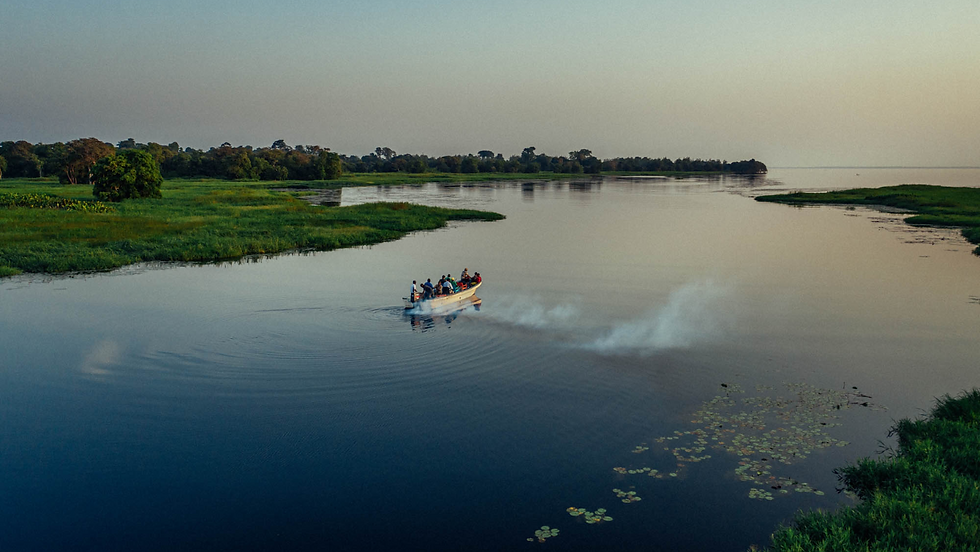Reasons for Wild Hope: February 2025
- Wildlife Works
- Feb 5
- 4 min read

It’s official: 2024 was the hottest year on record. Earth’s average land and ocean surface temperature was 2.32°F (1.29°C) above the 20th-century average, a stark reminder of the accelerating climate crisis. The consequences are undeniable—unusually warm ocean temperatures intensified Southern California’s Santa Ana winds, fueling the Los Angeles fires that claimed over 80 lives and caused an estimated $250 billion in damages.
In the latest edition of The Overview, Willow Defebaugh reminds us that in nature, “It is not the strongest of the species that survives, nor the most intelligent, but the one most responsive to change.” As climate change impacts escalate, so must our willingness to change. This lesson couldn’t be more relevant today.

Trump’s executive action to pull out of the Climate Paris Agreement could result in devastating impacts for African countries, which face the brunt of climate impacts despite contributing less than 4% of global emissions, as Wildlife Works African Climate Policy Director Olivia Adhiambo explains in her recent Op-Ed.
Yet, amid these challenges, there are also reasons for hope. Bloomberg Philanthropies has pledged to cover the UN climate funds lost due to the U.S. withdrawal from the Paris Agreement. The Democratic Republic of the Congo recently announced a historic new conservation area, and Kenya has recorded its third twin elephant birth in three years—a rare and promising sign for elephant populations.
Most importantly, as the new U.S administration rolls back environmental protections and weakens climate commitments, the private sector has a big opportunity to lead and take more action than ever.
Below, you’ll find updates from Wildlife Works that offer hope for global conservation efforts that work for communities. We end with a Voluntary Carbon Market Analysis to help you stay informed on the latest developments in climate action.
BLACK WATER: NOW STREAMING ON WATER BEAR

Wildlife Works' new film, Black Water, is now streaming on WaterBear! WaterBear is a groundbreaking storytelling platform dedicated to award-winning environmental films. 🌿 It’s free to watch and designed to inspire action through storytelling that connects audiences to causes they care about.
Black Water is a poignant exploration of survival and resilience deep in the remote forest of the Congo Basin. This short film delves into the lives of a local community around Lake Mai Ndombe (Lake of ‘Black Water’) in the Democratic Republic of the Congo. This once bountiful body of water now teeters on the brink of collapse. Over the years, the lake’s vibrant fish population has dwindled, threatening the livelihoods of those who have relied on its resources for generations. The vanishing fish population can be traced back to an unlikely culprit, but the community has a hopeful solution that could turn the tide.
EMPLOYEE SPOTLIGHT

Our global conservation work would not be possible without the dedication, expertise, and passion of our team members. Each month, get to know our team members and what they do through our Employee Spotlight Series. In this month’s spotlight meet Marilyn Elembe, a Facilitator for Women's Activities at the Wildlife Works Mai Ndombe REDD+ Project in the Democratic Republic of the Congo. With over 13 years of dedication to the project, Marilyn helps create new opportunities for local women, drives sustainable cassava farming, and builds trust with communities to protect forests and combat climate change.
MARKET ANALYSIS
This year is likely to see an increasing overlap in various carbon markets. Private developers who are operating projects (e.g., Del Agua’s cookstove project in Rwanda) are now producing credits that have received Corresponding Adjustments from the host country government.
This means the credits can be part of Article 6.2 transactions, or used for other purposes such as CORSIA compliance. We also continue to see domestic carbon schemes that allow some use of credits for compliance: Chile, for example, approved in December the use of credits from BioCarbon and Cercarbono for their carbon tax. Brazil’s recent emissions trading system legislation also opens the door for the use of credits from the voluntary market. While these developments will not necessarily directly increase demand for VCM credits, they will hopefully help build support for carbon markets in general and encourage host countries to put in place clear regulatory support for markets.
We will also see a slow development of two important parts of the market. First is CORSIA, the international aviation offsetting program. It is currently in Phase 1, and emissions from this phase must be accounted for by January 31st, 2028. Certain credits from the VCM are eligible. A big question is whether the US will remain a part of the program. Second is the Article 6.4 market. Last year’s COP brought momentum to this mechanism, and this year the 6.4 Supervisory Body will review methodologies for use under this system. Expect to see major developments on this front in the second half of the year.
DEEP-DIVE: SYNTHETIC BASELINES EXPLAINER

How do we effectively measure the impact of REDD+ projects on reducing emissions?A robust counterfactual is essential—an estimate of what deforestation would have looked like without the project. This article, written by Will Gochberg PhD, explains the role of Synthetic Control Methods to create accurate counterfactuals, and raises critical questions about factors affecting this tool’s viability.
